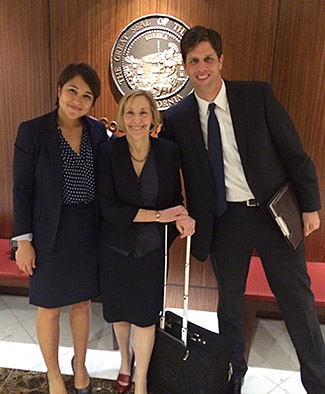By Andrew Cohen

Paul Meyer ’14, who helped the clinic gain a major
court victory last June.
Berkeley Law’s Death Penalty Clinic (DPC) was named one of the 15 most innovative clinics among U.S. law schools by National Jurist magazine. From student responsibilities to geographic focus, the clinic has long used an unconventional approach to capital defense.
Students accepted into the clinic are required to work there for a full school year, rather than a single semester like most clinics, because of the length and complexity of capital cases. And from the moment Director and Clinical Law Professor Elisabeth Semel founded DPC in 2001, she has sought to help clients all over the country—particularly in the South.
“This is a national law school with students who go on to practice throughout the United States,” Semel said. “More importantly, the death penalty is a national issue and the people who face the greatest risk of execution aren’t in California. We focused on Alabama, where there was and still is no right to a lawyer in capital post-conviction proceedings, and other southern states. To be a California law school prioritizing cases in the South was unexpected.”
Semel, former director of the American Bar Association’s Death Penalty Representation Project, served as a defense attorney for 25 years. After spending three years teaching a capital punishment seminar at Georgetown, she joined the Berkeley Law faculty. With only a handful of similar clinics—and no established template—she has steered DPC creatively, but carefully.
Since its inception, the clinic has directly represented clients in capital post-conviction proceedings. Several years in, however, it began tackling cases at trial and on appeal while partnering with non-profit capital defender offices and under-resourced appointed lawyers.
“About six years ago, we also started working on cases at the trial level, which almost no other clinics do,” Semel said. “We saw that we could help reduce the number of death sentences on the front end, in addition to helping clients who had been convicted.”
A telling example of DPC’s innovation is its Lethal Injection Project, which is steered by staff attorneys Megan McCracken and Jennifer Moreno. The project provides litigation resources and consultation to lawyers nationwide challenging the constitutionality of lethal injection.
“Megan and Jen bring a forward-thinking agility in staying on top of cutting-edge scientific issues and shifting state protocols,” Semel said. “The project is very meaningful to us and has been a powerful force in challenging egregious state practices.”
Where students shine
Other uncommon aspects of DPC: the depth to which students invest their time and emotional energy, and how much their feedback is valued in crafting case strategies.
“We’re always searching for new ways to best leverage and train these incredible students,” Semel said. “They bring so much creativity, brain power, and commitment to the table. They’re deep thinkers willing to question why we’re pursuing one angle and not another. It’s so valuable to get that kind of feedback.”
Clinic students immerse themselves in complex litigation—in the trial and appellate courts, and in the state and federal systems. They form relationships with indigent incarcerated clients, work with forensic experts, conduct field investigations, and draft motions and briefs. During his first semester at DPC, Christopher Lau ’13 spent nearly three weeks in Georgia working on a capital murder trial.
.jpg)
“The clinic was a big reason for my coming to Berkeley,” Lau said. “I’d heard a lot of inspiring things about its reputation, and it was a revelation to see how much dedication goes into giving a client a full defense. When someone’s life is at stake, you don’t take shortcuts.”
Students have helped spur two recent clinic victories. In 2013, working with DPC Associate Director Ty Alper, they made key contributions to a court case that invalidated California’s three-drug lethal injection protocol after the state illegally altered its execution regulations. That prompted the law firm Arnold & Porter to fully fund a DPC teaching fellowship for a year.
In June 2014, a team of clinic students working with Semel scored another triumph when the California Court of Appeal gave a death-row prisoner access to a district attorney’s records through the state’s Public Records Act—the first published opinion on that issue.
“We expose our students to a wide range of experiences that will serve them well no matter what field they pursue,” Alper said. “After a year, they don’t know everything, but they know how to approach new problems and how to best represent their clients.”